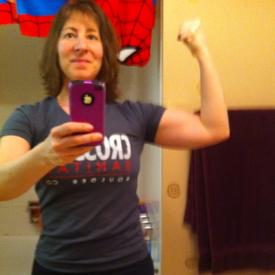Does gluten-free need to be 100% gluten-free?
Options

xxthoroughbred
Posts: 346 Member
I've decided I'm going to try my hand at going gluten-free. I haven't had any major reactions to it (not Celiac) but I've had low iron levels, bloating, aching joints, exhaustion and migraines. I think I've discovered that PB is my main migraine trigger but I would still like to see how the gluten-free lifestyle goes for everything else.
Now for my question: if I want to go "gluten-free," do I really need to cut ALL of it out? Obviously, those with Celiac's need to, but do I? Hypothetically, if I have gluten 1-2 times a week, will I still feel the effects I (think) I'm feeling now? Do I really need to cut everything out to get the benefits?
And is eating gluten-free more expensive?
Now for my question: if I want to go "gluten-free," do I really need to cut ALL of it out? Obviously, those with Celiac's need to, but do I? Hypothetically, if I have gluten 1-2 times a week, will I still feel the effects I (think) I'm feeling now? Do I really need to cut everything out to get the benefits?
And is eating gluten-free more expensive?
0
Replies
-
I've been wondering the same thing! I have the same symptoms you do - low iron, migraines, etc. - and I was thinking about going gluten-free but don't want to go 100%...0
-
Personally, I feel if you are going to go gluten free that you should not look for junk food alternatives that are the same junk food without gluten.
If you TRULY want to go gluten free then stick with meats, fats, fruits, vegetables, nuts, seeds, legumes and dairy.
Leave ALL fo the grains alone.
If you are not willing to do that, then there is no reason to do it.
I curse the day they started coming out with all these "products" that aren't even REAL food.
JUST EAT REAL FOOD!!!0 -
Personally, I feel if you are going to go gluten free that you should not look for junk food alternatives that are the same junk food without gluten.
If you are not willing to do that, then there is no reason to do it.
JUST EAT REAL FOOD!!!
^this person is smart0 -
If your gonna do it, you have to do it 100% or it won't work.0
-
Try going gluten free for one month. Then, eat something with gluten, and see how you feel. By that time, it'll have all worked out of your system and you can truly see (or feel rather) whether or not it bothers you.0
-
The only reason that you would need to go GF is if you have ciliac...if that's the case you should go 100% GF for your body to be healthy.0
-
ok, here is my take. I did this food challenge with one of those places that cooks food for you. I did it for 21 days and it was nearly all gluten free (not 100%, but close enough). In those 21 days my mood, my digestive system, my everything improved 100%. I don't have celiac or anything, I just wanted an eating challenge.
Since then, I have been trying to cut back on the gluten stuff. I don't feel as good as did then, so I figure I will have to almost cut it out completely.0 -
I AM allergic to gluten and even if I have a tiny bit ( 1 TBSP of barbQ sauce) I can feel the total effects of it. I don't think you can truly make a judgement about it if you aren't totally gluten-free. On the other hand, as soon as I went gluten -free I felt fine in 3 days. All symptoms disappeared. So i would try it totally for a week or 2 , then decide if it's for you.0
-
The only reason that you would need to go GF is if you have ciliac...if that's the case you should go 100% GF for your body to be healthy.
Totaly not this. There is a difference between gluten sensitive and celiac. Do a 30 day challenge as suggested above and then test by adding things bak or at a time, every few days. You might find you can eat oats, but not wheat, or wheat, but only in smaller amounts, or that any wheat bothers you.
http://www.marksdailyapple.com/how-common-is-gluten-sensitivity/0 -
Personally, I feel if you are going to go gluten free that you should not look for junk food alternatives that are the same junk food without gluten.
If you TRULY want to go gluten free then stick with meats, fats, fruits, vegetables, nuts, seeds, legumes and dairy.
Leave ALL fo the grains alone.
If you are not willing to do that, then there is no reason to do it.
I curse the day they started coming out with all these "products" that aren't even REAL food.
JUST EAT REAL FOOD!!!
This right here.0 -
Yes, it is very expensive to go GF if you use replacement products for bread, sweets etc. Gluten hides in many foods like Barley Malt is in most mixed seasoning blends and soy sauce in many commercial sauces...so these are hard to avoid if you don't really have to for health reasons.
It may just be grains that are causing you irritation. I do have celiacs and only eat the GF replacements as little as possible since they are very high in fats, sugar, hence calories. I will say though if I follow a Paleo lifestyle my joints are very happy. Just don't have the will power or desire to not eat some of the foods not allowed.
Personally, I don't recommend GF for anyone who doesn't have to just because of the challenge to get enough fiber in your diet. Best idea is keep a food diary and see if you can determine what does make you feel less than 100%, in my opinion:)0 -
The only reason that you would need to go GF is if you have ciliac...if that's the case you should go 100% GF for your body to be healthy.
This is not true at all. And yes, you need to go 100% gluten free or it's a waste of time. As the others have said try it for 30 days and then eat something with gluten to see if you can tell the difference. I am not celiac but gluten affects me in the form of a really itchy rash all over my legs. Yes, I have "tested" a few times to make sure that is what it really is, and yes, any little bit of gluten causes it.0 -
Echoing what others have already said: if you're going to try it as a potential fix for your ailments, you do need to go 100% gluten-free, and read your food labels very carefully. The four main culprits are WBRO - wheat, barley, rye, and oats (there are certified gluten-free oats, but there is a reported risk of contamination of regular oats by wheat grown in the same or nearby fields). This does include spelt, farro, and other wheat variations. Cross-contamination is a huge problem, especially in restaurants (think shared pans, utensils, frying oil, etc.), and also if you're the only one in your house keeping gluten-free, so be careful about how and where your food is prepared. But for the sake of your health and diet, don't just go bananas on the prepackaged "substitute" foods. Some people get sick to their stomach from xanthan gum, which is a popular additive to gluten-free bread products. I personally can't eat Glutino brand pretzels (specifically that brand) without getting bloated and gassy, and I suspect it's because they use a lot of xanthan gum. Anyway, you will also need to find ways to supplement your fiber intake, because most "gluten-free" products are very low in fiber compared to their wheat-based counterparts. I would suggest increasing your roughage and/or using a gluten-free fiber supplement like acacia powder.
I started an elimination diet before I realized that, in order for one of the blood tests to show anything significant, you must consume your "normal" (pre-elimination) amount of gluten for 4 weeks prior to the test. The second test is for genetic markers, I believe. I took the tests and came up negative for genetic markers, but the antibody test was inconclusive, probably because I'd been reducing and had almost eliminated my gluten intake for two weeks beforehand.
I can't say for sure if I "felt better" during my first elimination period, as I had been on an immunosuppressant (Imuran) for nearly a year before I tried going GF, as I'd been misdiagnosed with ulcerative colitis in 2009 after several months of horrible GI symptoms. I didn't want to take it anymore, though, so I tried eliminating gluten while going off of Imuran (against my doctor's wishes - hint: don't do that). When I didn't have any symptoms even though I was off the Imuran, I decided it was probably working, so I have kept at it. Unfortunately, I kept my carb intake high - I was going through a big pot of rice every week or even more often than that - and also used a lot of substitute breads and crackers, and I ended up gaining about 15 lbs initially. Since then, I've changed how I eat - I don't follow any brand-name (or off-brand) diet plans, but I just try to keep my carbs limited to fiber and fruit/vegetable sources. One simple change, although it might take some getting used to flavor-wise, is that I eat sandwiches rolled in lettuce leaves instead of tortillas or bread.
The times I've strayed from keeping gluten-free have been regrettable. I get achy in my joints, my brain feels foggy and my low-grade depression often spikes, I am constantly tired, my sinuses are very stuffy and/or runny and I sneeze a lot, and my digestive system starts staging a coup. That's also my sign that I may have accidentally eaten something with gluten in it (colloquially referred to as "I got glutened"). It takes me a good week or so of returning to a 100% gluten-free diet to feel "healthy" again.
Of course, YMMV on all of this, but that's my experience. I started on the gluten-free wagon in the middle of 2010, and despite having fallen off of it HARD a few times, I keep coming back because my body responds well to it. Or perhaps more importantly, my body responds very negatively when I "cheat," and it's definitely more than a placebo-type effect.
ETA: Another thing about eating gluten-free is that you can't just take the bun off of a sandwich or pull the croutons off of a salad and have it be gluten-free. It has to have never been touched by the gluten-containing ingredients in the first place. I know that probably seems extreme, but even a tiny bit as in, "oops, I forgot these potatoes were topped with bread crumbs, I'll just scrape 'em off" can screw me up. It may not be the same for everyone, but especially for anyone who's been diagnosed with Celiac disease, it is a must to completely avoid gluten.0
This discussion has been closed.
Categories
- All Categories
- 1.4M Health, Wellness and Goals
- 396.8K Introduce Yourself
- 44.2K Getting Started
- 260.9K Health and Weight Loss
- 176.3K Food and Nutrition
- 47.6K Recipes
- 232.8K Fitness and Exercise
- 451 Sleep, Mindfulness and Overall Wellness
- 6.5K Goal: Maintaining Weight
- 8.7K Goal: Gaining Weight and Body Building
- 153.3K Motivation and Support
- 8.3K Challenges
- 1.3K Debate Club
- 96.5K Chit-Chat
- 2.6K Fun and Games
- 4.5K MyFitnessPal Information
- 16 News and Announcements
- 18 MyFitnessPal Academy
- 1.4K Feature Suggestions and Ideas
- 3.1K MyFitnessPal Tech Support Questions











